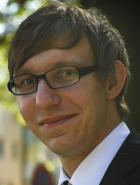Dipl.-Ing. (FH) Stephan Adler

AG Technische Informatik
Institut für Informatik
Fachbereich Mathematik und Informatik
External PhD student
About
I joined the working group Computer Systems & Telematics (CST) at the FU Berlin in 2009, after working for the measurement device company "imc Meßsysteme". I graduated from the TFH Berlin in 2008.
Teaching
- 2013: Vorlesung "Rechnerarchitektur" im Rahmen von ProInformatik
- 2013: "Das Web vergisst nie" - 3 Veranstaltungen an der Helmuth-James-von-Moltke-Grundschule, Berlin
- 2011 + 2012: Kinderuni "Das Web vergisst nie".
- Vertretungsvorlesung TI III: "Einführung in Buffer Overflows"
- Sommeruni 2010 Java Programmierkurs
- Einführungsvortrag
- Leerprojekt (Template)
- Ergebnisse
Publications
Stephan Adler, Simon Schmitt, and Marcel Kyas, Path Loss and Multipath Effects in a Real World Indoor Localization Scenario, Best Paper Award, In proceedings, IEEE Workshop on Positioning, Navigation and Communication (WPNC) 2014, Dresden, Germany
Stephan Adler, Simon Schmitt, Heiko Will, Thomas Hillebrandt, and Marcel Kyas, Virtual Testbed for Indoor Localization, In proceedings, IEEE International Conference on Indoor Positioning and Indoor Navigation (IPIN) 2013, Montbeliard, France
Krasimira Kapitanova and Sang H. Son, Book chapter Event Detection in Wireless Sensor Networks, in Intelligent Sensor Networks: Across Sensing, Signal Processing, and Machine Learning, Fei Hu and Qi Hao (ed.), Taylor & Francis LLC, pp. 441-458, CRC Press 2012.
Georg Wittenburg, Norman Dziengel, Stephan Adler, Zakaria Kasmi, Marco Ziegert and Jochen H. Schiller. Cooperative event detection in wireless sensor networks. IEEE Communications Magazine 50(12): 124-131 (2012)
Heiko Will, Stefan Pfeiffer, Stephan Adler, Thomas Hillebrandt and Jochen Schiller. Distance Measurement in Wireless Sensor Networks with Low Cost Components. In: 2nd International Conference on Indoor Positioning and Indoor Navigation (IPIN 2011)
Demo: Heiko Will, Stefan Pfeiffer, Stephan Adler, Thomas Hillebrandt and Jochen Schiller. Distance Measurement in Wireless Sensor Networks with Low Cost Components. In: 2nd International Conference on Indoor Positioning and Indoor Navigation (IPIN 2011)
Oliver Hahm, Stephan Adler, Nicolai Schmittberger, Mesut Günes. Energy Profiling for Wireless Sensor Networks. GI/ITG KuVS Fachgespräch Sensornetze 2011, Paderborn, September 2011. (PDF)
Norman Dziengel, Marco Ziegert, Stephan Adler, Zakaria Kasmi, Stefan Pfeiffer and Jochen Schiller. Energy-Aware Distributed Fence Surveillance for Wireless Sensor Networks. In: 7th International Conference on Intelligent Sensors, Sensor Networks and Information Processing (ISSNIP 2011)
Norman Dziengel, Marco Ziegert, Zakaria Kasmi, Frederik Hermans,Stephan Adler, Georg Wittenburg, and Jochen Schiller. A Platform for Distributed Event Detection in Wireless Sensor Networks. In: First International Workshop on Networks of Cooperating Objects (CONET 2010). Stockholm, Sweden (Apr 2010) slides
Projects
VIVE
VIVE validates a distributed event detection that provides a pattern matching based framework for wireless sensor networks. Groups of sensor nodes share information in a cooperative way which allows to evaluate events autonomously within the network. VIVE investigates new applications that benefit of an in-network evaluation of predefined events. The wireless Compounds of sensor nodes are sharing information in a cooperative way which allows to evaluate events autonomously within the network. Transferred data is reduced and evaluated within the network which allows short response time on events. As a result, the lifetime of the whole network will be enhanced.
AVS-Extrem
AVS-Extrem is a use case for Wireless Sensor Networks (WSNs) focused on collaborative, in-network data processing. The goal is to develop a distributed event detection system that can reliably report security relevant incidents (e.g. a person climbing over a fence and accessing restricted areas to a base station. The vision is that through cooperation of many sensor nodes the accuracy of event detection can be greatly improved, while at the same time saving energy by reducing multi-hop communication with the base station. More information about the AVS-Extreme project is available on the AVS-Extreme homepage.